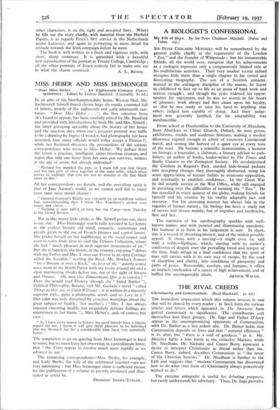MISS HEBER AND MISS IREMONGER
IN an attic of his Northamptonshire home, Weston Hall, Mr. Sacheverell Sitwell found eleven large tin trunks crammed full
of letters, mostly of the eighteenth and early nineteenth cen- turies. " Dear Miss Heber . . .", the first selection from th. s hoard to appear, has been carefully edited by Mr. Bamford and provided with introductions by both Mr. and Mrs. Sitwell ;
the latter gossiping agreeably about the history of her house and the spacious days when one's passport portrait was liable to be a drawing by Ingres (I wonder, had photography not been invented, how many officials would today accept a Picasso ?), while her husband discusses the personalities of the various correspondents who wrote to Miss Heber. We deduce from the letters a gracious, intelligent, rather frivolous creature, and regret that only one letter from her own pen survives, written at the age of seven, but already individual : "Richard has mended the pen, so I must tell you that Grany and her two girls sit close together at the same table, which often moves so sudingly that you are not to wonder at the fine black spots in this."
All her correspondents are female, and the prevailing spirit is that of Jane Austen's world, so we cannot well fail to enjoy even their most trivial chatter :
"General Conway's Riddle was certainly on an indelicate subject but, notwithstanding that, I think Mrs. Fanshawe's answer very smart and clever. . . ."
"Nothing is now talk'd of here but the Camp—next Tuesday is the Grand Review. . . ."
But in this merry little circle, as Mr. Sitwell points out, there is one star. Miss Iremonger stands fully revealed in her letters as the perfect literary old maid, romantic, sententious and greatly given to the use of French phrases and capital letters.
She prides herself on her indifference to the social round, and even in town finds time to visit the Orleans Collection, where she had "much pleasure in such superior monuments of art." But she is happiest, she insists, in the country, enjoying " drives with my Father and Mrs. I. over our Forest in an open Carriage
called the Sociable," reading the Revd. Mr. Bowles's Sonnets "by a Stream or over a Rock," or, best of all, "quietly seated once more in my North Parlor with my books around me and a
clear murmuring rivulet before me, out of the sight of Streets
and Houses. Oh, mon cher Zimmermann, Que je te soutenai ! " Here she would read History (though she "hated Battles "), Political Philosophy, Botany, and Mr. Godwin's novel "called Things as they are, or Caleb Williams : it is written in a masterly superior style, quite a philosophic novel, and no Love in it."
Her calm was only disturbed by ceaseless worryings about the
great subject of health : her mother's (" Mrs. I. has always enjoyed charming health, but exquisitely delicate feelings are interwoven in her frame "), Miss Heber's, and, of course, her
own
"As I have every reason to believe my good friends have a sincere regard for me, I know it will give them pleasure to be informed that my Stomach has for a considerable time been very materially better.'
The temptation to go on quoting from Miss Iremonger is hard to resist, but we must leave her observing, in a penultimate letter, that "the Years appear to revolve much more rapidly as we advance in age."
The remaining correspondents—Mrs. Drake, for example, and Lady Banks, the wife of the celebrated scientist—are not very interesting : but Miss Iremonger alone is sufficient excuse for the publication of a volume as prettily produced and illus- trated as could be. DESMOND SHAWE-TAYLOR.














































 Previous page
Previous page